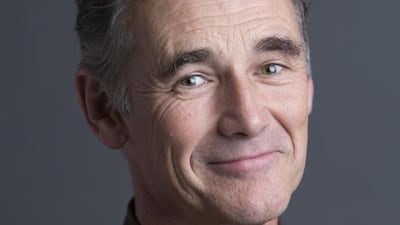British actor Mark Rylance has enjoyed plenty of critical acclaim during a career spanning 35 years.
A renowned stage actor in London and New York, with two Olivier and three Tony awards to his name, he was the first artistic director of Shakespeare’s Globe theatre in London.
His film credits include The Other Boleyn Girl, while on the small screen he won a Bafta for his portrayal of the late Dr David Kelly, a former British weapons inspector in Iraq, in The Government Inspector.
This year, he earned rave reviews, and an Emmy nomination, for his role as Henry VIII's adviser, Thomas Cromwell, in the BBC's critically acclaimed historical drama Wolf Hall.
Now he is starring alongside Tom Hanks in director Steven Spielberg's real-life Cold War drama Bridge of Spies.
Tell us about your character in Bridge of Spies.
I play Rudolf Abel, a Russian spy who was captured and arrested in America. We don’t really know all that much about him, other than the fact that he received and passed on messages at various drop sites throughout New York using a hollow coin. He was hiding out in a kind of bohemian artists’ warehouse in Brooklyn with all of these young guys who were, what you would call, “left of centre”. Eventually, the New York Bar Association gets an insurance lawyer, James Donovan, played by Tom Hanks, to agree to represent Abel, knowing that he was involved in the Nuremberg Trials and had some knowledge of foreign matters like this.
How would you describe the film?
It is a Cold War thriller with the psychology of James Donovan’s actions at its heart. It’s fascinating to see how an honest, hard-working lawyer such as Donovan gets drawn into the powerful corridors of the CIA and the FBI, and the subtleties of international relations between America and the Soviet Union at that time.
How was it working with Tom Hanks?
The day before we started filming, he invited me over to read through the script with him, since a big part of the story is the relationship between their characters, which was very considerate. What surprised me the most about Tom is that he loves to make people laugh and has this very goofy sense of humour which immediately puts people at ease.
What do you hope audiences take away from the film?
This is a film about an unsung civilian hero, James Donovan, who does the right thing at the right time in the right place. He risks his own comfort, safety and employment, and his family’s comfort and safety as well, just to do the right thing – and that’s an important story. But this is also a thriller, and is extremely relevant in the way we deal with international affairs, which is so different from the way we deal with family and business affairs, so it does have a resonance for the present issues of justice on an international front.
artslife@thenational.ae

